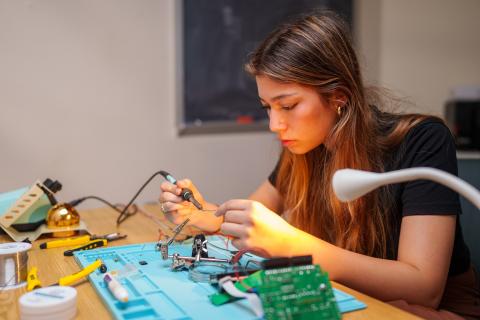
Misconception 1: Disability means inability
One of the most common misconceptions about disability is that it means inability. While the words may be close, conceptually these concepts couldn’t be further apart. Disability is a variation in human functioning. People with disabilities can and do engage in the world in a wide variety of ways. While some of these ways may be different, people with disabilities are more than capable of learning, teaching, working, and thriving in higher education. Additionally, all people have far more strengths than they do weaknesses. While people with disabilities may have functional limitations in some areas, they excel in many others.
Misconception 2: Disability is a personal “problem”
Some people associate disabilities as being some sort of personal “problem”. Disability certainly influences an individual’s life in different ways depending on the individual and their circumstance. However, disability is not a problem that needs to be “fixed.” Disability should be understood, celebrated, and centered. All people are continually growing, learning, and improving, and it is more important and valuable to address inaccessible environments that limit the participation and progress of people with disabilities.
Misconception 3: People with disabilities need your “help”
It is a common misconception that people with disabilities need help from the temporarily able bodied. The reality is that people with disabilities want to be independent and want to achieve individual success. Whether or not someone has a disability, we all need help sometimes. As with anyone else, if you feel like someone might need help, it is best to ask prior to providing any help.
Another variation of this misconception is that people with disabilities need more help than other people. While it is true that people with disabilities may need different types of support, much of the time the assistance they need is related to navigating inaccessible environments.
Misconception 4: All people with the same disability label will have the same experiences and characteristics
Many people overgeneralize what they have learned about a specific disability by applying it to all individuals they meet with that label. They believe that all people with the same label will have the same characteristics and have had common experiences. The reality is that people with disabilities are diverse and hold many different identities, and experiences are equally diverse. It is important to understand the lived experience of each individual. As is commonly said in the disability community, when you have met one person with a disability… you have met one person with a disability.
Misconception 5: Disability is a bad word
Sometimes people are nervous about saying the word “disability.” Being thoughtful and considerate with the words you chose to use when talking about disability and people with disabilities is a good thing, but avoiding the term disability altogether is not helpful.
Disability is not a bad word or something that should be hidden. Consideration of disabilities should be central to our decision making and central to how we provide access to all individuals. That means we need to think critically about disability, actively work toward destigmatization, incorporate accessibility and inclusion into our planning, and talk about disability openly.
Of course, how we address and understand disability is critical. We need to understand what it means to have a disability and, importantly, the barriers people with disabilities face are often within culture and environments. Disability is not a bad word, but inaccessible practices and ableism are not acceptable.